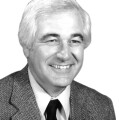News & Articles
Browse all content by date.

Is life a walking shadow, full of fury, signifying nothing?
As “The Chosen One” Donald Trump roamed the 110F Vegas stage in a jacket ranting and railing against undocumented immigrants invading the US “changing the fabric of our country” like “animals” and “not people,” I thought of the Elizabethan Chain of Being used by Shakespeare to describe what happens when an unworthy person advances beyond his competence, class and standing.
Four hundred years later we now call it the Peter Principle to describe our human failures in government and business. How many men and women have been promoted or voted in beyond their capabilities? Joe McCarthy? Richard Nixon? King Macbeth? Lady Macbeth? Henry VIII?
Shakespeare wrote plays about heroes and incompetents, proving he was a good historian. Hamlet never seemed to make up his mind. King Macbeth sums up his ill-conceived movement up the Chain after he learns his wife (“Who would have thought the old man (King Duncan) would have had so much blood in him?”) after everything he has touched goes to hell and his wife commits suicide: “Life’s but a walking shadow, a poor player, that struts and frets his hour on the stage, and then is heard no more. It is a tale told by an idiot, full of sound and fury, signifying nothing.”
It is a short eulogy that could be used to describe Donald Trump’s life in the shadows and the bright lights. It is quite evident that Donald’s parents exiled him from their house to a military school as a teenager because he had a severe case of congenital malignant narcissism. His fellow students said he constantly showed contempt for “military service, discipline, and tradition while displaying an ungoverned sense of entitlement.”
With his more than 30,000 lies tracked by the media over the last eight years, The Chosen One has placed his name and star in the 5th Edition of the American Psychiatric Association’s Manual of Mental Disabilities (DSM-5-TR) which lists the criteria for hundreds of mental conditions. Read the criteria for psychopath and sociopath and see if he isn’t a match for every criterion. Since childhood he has expressed disdain and disgust for the military while often claiming to adore them. Maybe it’s because he has always been a coward, Senator John McCain, the son of a Navy admiral, was not a hero for being shot down and spending six years in the Hanoi Hilton.
According to the “Orange Genius,” among the “suckers and losers” of society were our miliary on Normandy Beach who died on D-Day, June 6, 1944. There were quite a few ex-military veterans in the police forces fighting Trump’s insurrection on January 6, 2021 when 140 were injured by “tourists visiting the capitol.”
Where residents in one of the richest cities on earth live in constant fear
Some days I get so damn angry about what happens in the Divided States of America I could die laughing—if that makes any sense. I experienced that feeling last week when the Fifth US Court of Appeals issued a 76-page majority opinion that said the state of Texas could not ban books from libraries that mention “butt” and “fart” in the texts. How can it take 76 pages to say “No!” or even “No! You can’t do that!!”? Are judges being paid by the word? I don’t dare read the decision because it might bring on a deadly case of personal apoplexy. Does it take 76 pages to determine that butts and farts are closely related? I hope the opinion is not a “tale told by an idiot.”
Is there a human on Planet Earth who has always been successful in having silent, effluvial farts? The court did have one sentence that encapsulated the 76 pages: “This court has declared that officials may not remove books from school library shelves simply because they dislike the idea contained in those books and seek by their removal to prescribe what shall be orthodox in politics, nationalism, or other matters of opinion.”
Is there something more orthodox than a fart escaping from a butt? Back to my column!
When it comes to economic inequality in the Divided States of America, San Francisco, one of the richest cities per capita in the world, the home of Silicon Valley billionaires and the poor who pick fruit, clean toilets, make beds, and dump garbage, is a microcosm of the richest country in the world. Every judge and politician should read Linda Greenhouse’s review of Lawrence Ralph’s book about Sito: An American Teenager and the City that failed Him published in the “New York Review of Books.”
Greenhouse has covered the Supreme Court for decades and I never miss her. She shows so much logic, common sense, and intelligence in writing about the Court and its Chief and Associate Justices, she would definitely improve the opinions and decisions of the Court if she were appointed to replace any one of them.
When a walk to school or a bike ride to the park can go terribly wrong
In a city where a starter or fixer-upper home is over a million and thousands live on the streets in tents or huddled in newspapers or blankets, life among the brown and black children can be short in a very rich city. Firearms are the leading cause of death among young children and older black children while the leading cause of death among Latinos ages 15 to 24 are accidents, but murder ranks a very close second. Ralph’s book is about the life and death of 19-year-old Latino Luis Alberto Quinonez, alias “Sito.” So you know now, Sito, on September 8, 2019, was on his way to have dinner with his girlfriend and her mother when he was murdered at the wheel of his car in the Mission District. Sito had joined a street gang at age fourteen in the Mission area because every poor Latino boy and girl needs “protection.” He had grown up, so to speak, in this area with his mother and father who was a former gang leader and convicted drug dealer.
Sito had started his life of crime when at age 12 he snatched a cellphone from a diner’s restaurant table and the woman ran after him yelling “Thief!!” A policeman caught Sito and he spent a month in a group home for young criminals. Several gangs controlled very specific but unmarked sections of the Mission. If a young resident Latino entered a different area from one he lived in without permission, he knew he was in very unfriendly territory and would have to fight his way out. He was physically still in one piece at age 19 but emotionally he was a mess of little pieces and had been deeply wounded when he had to spend five months in a juvenile prison for a murder he did not commit. The police knew he had not committed this murder, but they knew Sito knew who had committed the murder. One of his friends from school had done it. But the police and everybody else in the local gangs knew if Sito turned into a “snitch” he might not survive the day.
Sito was finally ignored by the police when the actual killer was murdered by another gang member. It fell under one of the rules of this Mission District “society”: violence begets violence but also creates street justice. Inmates of the juvenile prison usually “graduated” with a severe case of PTSD. After his release, Sito lived in a sort of alcoholic haze, according to his mother. He continued to drink heavily. A fellow gang member said he spent a lot of time by age sixteen going to at least 50 funerals of gang members but only one school graduation.
Academically gifted gang members could not survive the Mission District if they displayed “smarts.” Better to play dumb and live than to act smart and die from guns. Everybody had a gun or could steal one at a moment’s notice. If smart you were called “Whitey,” “nerd,” and “geek.” Many smart kids did not show for graduation because of the fear of hearing “geek!” from the audience
Writer Ta-Nehesi Coates, the favorite target of Trumplican book banners, describes his life as a child: “My life was the immediate negotiation of violence—within my house and without. When I was 11 my highest priority was the simple security of my body.”
Now, I’m going to snitch on the author of Sito’s “biography”
Lawrence Ralph had grown up in Atlanta and Baltimore ghettos where he had also feared gangs and police, so he had met Sito only once. He had known an awful lot about Sito’s life from his wife, Aisha-Beliso-De Jesus, who had also lived in the Mission District area. At age 12 she had been evicted from an apartment with her mother because both used drugs, and at 14 had a son named Neto, fathered by a slightly older gang member who had offered her protection after she and her mother had been evicted. But she took a different path. She went to college, earned a PH.D, and finally married an Ivy League professor named------Lawrence Ralph.
Ralph is a professor of anthropology at Princeton where his wife is also an anthropologist. The two are directors of an organization called the Center of Transitional Policing. Ralph calls himself a “gang scholar” because as a graduate student at the University of Chicago he had spent three years among members of Chicago gangs. He worked with many young gang members confined in wheelchairs because they had been shot in or near their spines in gunfights.
Shakespeare says through the lips of King Macbeth that life is in the shadows where strange things happen, that it may be told by an idiot or moron and has no more significance than an idiot’s pointless ramblings. So here we have King Donald, raised in a Manhattan mansion by a multi-millionaire in the financial capital and richest clty in the world, where the “best life” is displayed on stages in Broadway theaters, the most beautiful operas in the Metropolitan Opera, and the finest and most expensive kindergartens, private schools, and universities, who fills the air with sound, fury, and lies while becoming a 34-count felon to sit in his mob home Mara-a-Loco, and is described by our top Army general as a moron, a person with emotional and intellectual disabilities. All this while two ex-gang members raised in poverty, squalor, drugs, and constant fear are both working at an Ivy League university to turn ganged cities into shining citadels on hills.
| Tweet |


